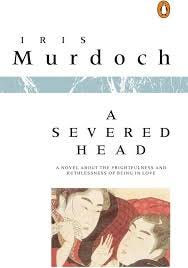Iris Murdoch, A Severed Head
vacant agreeable noises & accidental Live photos
“The sky had been leaden yellow in London and as we passed Reading some snow began to fall in large rare flakes out of a still air.”
Iris Murdoch is — thank God — good at weather. Because otherwise her books, so talky and ruminative, so microscopically attuned to every quiver of feeling and every sub-sub-unit of thought, would risk airlessness. We might not be able to breathe inside them.
Weather is, for a novelist, a fraught thing. Elmore Leonard famously says to never start a book with weather (good advice, habitually and bafflingly defied by Jonathan Franzen), and it’s tempting to leap from this to: never write about weather at all. Because a book is after all a conversation, and weather is a famously tedious subject for conversation, so why not just be done with it and trust the reader to supply her own window-whitening rainstorms and crystalline skies? Don’t weather descriptions always have a certain hold-music quality, a sense of an author making vacant agreeable noises while he thinks up what to say next? Surely people are more interesting than cloud formations?
Hemingway pipes up: “Remember to get the weather in your damn book — weather is very important.”
And much as I wish he weren’t, he’s right. Because without the weather, Murdoch’s A Severed Head — which I enjoyed hugely, and raced through in a few days — would be nearly unreadable. Her characters are so fragile and self-consumed, so prone to saying things like:
I was lying on the big sofa at Hereford Square reading Napier’s History of the Peninsular War and wondering whether Georgie’s incense was going to give me asthma.
— that your inner Teddy Roosevelt will burst forth; you will want to snatch away their library cards and force them into the fresh air.
But before I get into how weather works in Murdoch’s book — and how weather works in books generally — I should say: A Severed Head is a two-hundred page, dialog-rich novel about an anguished love triangle that grows into an anguished love dodecahedron. It reads like a Greek myth (the operatic misery, the specter of violence) as told by P.G. Wodehouse (the casual wit, the hectic comings and goings). I read a heavily underlined copy that I found on someone’s stoop, and I was right there with the previous reader’s colorful exclamation points and all-caps outbursts (STAND UP FOR YOURSELF, MARTIN!). This is a book that moves.
And one of the lubricants in its joints is the weather. Every few pages — between the psychoanalytic appointments and the alcohol-fueled confrontations — Murdoch drops in a reminder that there is in fact a world outside her characters’ heads. There is (because this is mid-20th-century-London) the fog:
The front door was open and outside, hung like a blanket a yard from the opening, was the fog, yellow, opaque, infernal, completely still.
And, more invigorating, there is the snow.
Early on the narrator, Martin — who is of course having an affair of his own— learns that his wife has fallen in love with her psychoanalyst. In despair Martin leaves London to spend Christmas with his siblings at Rembers, their family home (this is a book in which even shabby academic people have family homes, and those homes have names). Murdoch writes:
It was lunch time on Christmas Eve, and I was in the Oxford train. The sky had been leaden yellow in London and as we passed Reading some snow began to fall in rare large flakes out of a still air. It was very cold.
Does this passage not feel like staring out from a train and feeling the desolate but bracing cold seep in through the window’s unclose-able crack?
It’s that second sentence that especially affects me, the one with the “rare large flakes out of a still air.” There’s the sentence’s lack of commas, first of all — Murdoch’s writing is so subtle and intricate that you expect it to be studded with punctuational interruptions of every sort, but it’s often quite bare; she lets you hear the rhythm yourself.
And that unexpected word rare, which gives us the feeling of the passing seconds (it’s like when someone accidentally sends you a Live photo and, under your finger, the still scene lurches startlingly to life). And all those one-syllable words, each one a sharp clear shard, falling like snowflakes (by the time she gets to out of a still air she is practically twirling with her coat off). We, like Martin, are for a moment returned to silence and space.
Murdoch uses the weather as a moment of necessary rest; as a film score, both reflecting and informing her characters’ raw inner states; and, crucially, as a clock, an unobtrusive reminder for the reader of her novel’s timeline (the week around New Year’s, more or less). The feeling is not that she had to remember to get the weather into her damn book, any more than we have to remember to get the weather into our damn lives. It was there all along.
Happy Thanksgiving! I’m grateful as always that you take the time to read this (and to read generally). See you in December. -Ben



Ben, I do so much admire your verbal dexterity.
Have you read The Transit of Venus? It opens with an incredible description of a hurricane, but it takes a while to figure out what's going on.